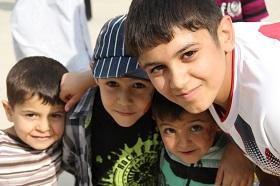Using AI to control energy for indoor agriculture
30 September 2024
Published online 19 August 2013

Aid organizations are failing to address the urgent health needs of millions of Syrians, domestically and of those driven from home, according to an internal review of the UN Refugee Agency, UNHCR. Its report pointed to a lack of long-term strategies and poor coordination to explain the agencies' shortfalls.
The internal report "From slow boil to breaking point," published in July, said UNHCR did not develop a coordinated response in the earlier stages of the Syrian emergency, despite its mandate to "lead and coordinate international action" for refugees1.
"There has been a perception that UNHCR was at times more preoccupied with managing its own operations than coordinating the overall refugee response," the report says.
The Syrian crisis has worsened significantly, with the number of registered refugees rising from 65,253 to 1.53 million over the past year. About 8,000 people are reportedly fleeing the country every day and UNHCR has struggled to deal with the rising numbers of refugees since the latter half of 2012. With more intense fighting, some expect that predictions of 3.5 million refugees may be realized earlier than the forecasted end of 2013.
A recent assessment of North Syria identified health issues as the most grave risk Syrians face. Some 70% of medical professionals have fled the country and 60% of healthcare facilities in opposition-controlled areas have been damaged or destroyed. Outbreaks of communicable diseases such as measles, typhoid, leishmaniasis and hepatitis are rife while treatment for chronic illnesses such as diabetes, hypertension and cancer are not available2.
"It's the classic illnesses of poverty: infant mortality is high, childbirth weights are low, and there's no access to reproductive health," says Adam Coutts, a researcher for the University of Cambridge who has written about Syrian health issues.
In the immediate vicinity, the healthcare and infrastructure systems of Jordan and Lebanon have been strained by the influx of refugees. UNHCR has reduced its reimbursements for health care due to funding shortfalls and most refugees cannot afford to pay the difference.
"It is the poor people who suffer most, so when the healthcare system is not functioning very well in Lebanon or Jordan or Turkey, it is not the billionaire who suffers, it is the poor woman in the village," says Patterson Macharia Njogu, a senior public health officer for UNHCR.
Coutts suggests that at least part of the health crisis results from poor strategic planning by aid agencies. Many organizations use a "template" from other humanitarian endeavors that doesn't fit the Syrian crisis. He urged aid agencies to develop long-term plans for building infrastructure and public services, a recommendation included in the UNHCR report.
However, Njogu and Fabio Forgione, Lebanon's head of mission for Médecins Sans Frontières, are skeptical that long-term planning could be effective when there are already funding shortfalls. And when the conflict ends, a plan will be needed for the repatriation of millions of Syrians to their devastated homes or agencies will again face having to respond to an emergency rather than being prepared for it.
"We are putting together some medium-to-long-term solutions on how you rebuild the health system inside Syria, but we could have built infrastructure [elsewhere] before the crisis," Coutts said.
doi:10.1038/nmiddleeast.2013.129
Stay connected: